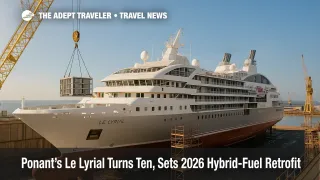Ponant's Le Lyrial Turns Ten, Sets 2026 Hybrid-Fuel Retrofit

As it celebrates a decade in service, Ponant has chosen its 264 passenger yacht Le Lyrial, delivered April 11, 2015, for a hybrid fuel refit at a European yard in 2026. The upgrade will add bio-LNG capable generators and high capacity batteries, targeting a 15 percent carbon cut as part of the line's Swap2Zero roadmap. Work will follow the vessel's 2025-26 Antarctic season and mark the first mid-life green conversion among Ponant's four Boreal class sisters.
Key Points
- Why it matters: First Boreal class hybrid fuel retrofit boosts Ponant's decarbonization push.
- Travel impact: Expedition cruise fans gain quieter, lower emission sailings in polar regions.
- What's next: Yard period in 2026 will install bio-LNG generators and new battery packs.
- Decarbonization targets, 15 percent CO₂ cut by 2026, 30 percent by 2030.
Snapshot
Ponant has earmarked its 264 passenger yacht Le Lyrial for a hybrid fuel overhaul in 2026, the first step in converting all four Boreal class ships. The project, part of the line's Swap2Zero roadmap, will add multi-fuel generators able to burn bio-LNG and install high capacity battery modules to slash hotel load emissions. Le Lyrial will keep sailing her 2025-26 program that spans Greenland, the Canadian Arctic, Canada and New England, plus an Antarctic season round-trip from Ushuaia before heading to the yard.
Background
Delivered on April 11, 2015 by Fincantieri's Ancona yard, Le Lyrial is the fourth Boreal class expedition cruise yacht. The 10,944 GT vessel carries 122 sea view staterooms and suites and is known for quiet Ice Class 1C operations in remote regions. Ponant's decarbonization strategy builds on the LNG powered, hybrid electric Le Commandant Charcot and now shifts to retrofitting existing tonnage rather than newbuilds. Swap2Zero sets a pathway to 15 percent lower fleetwide CO2 by 2026, 30 percent by 2030 and 80 percent by 2040, anticipating tighter IMO limits.
Latest Developments
Yard scope focuses on engines, batteries, and hotel load
Le Lyrial's 2026 refit will replace two conventional Wärtsilä diesel engines with multi-fuel units certified for bio-LNG, while a new battery array will let the yacht operate in port on stored power for up to three hours. A bespoke energy management system will prioritize battery discharge at low speeds, trimming fuel burn and noise in wildlife sensitive zones. Ponant expects a 15 percent CO2 reduction immediately after the refit and aims for 30 percent once sister ships follow in 2028.
Deployment adjustments keep guest experience intact
To free yard time, Ponant has opened extra 2025 departures of its Greenland and Great Lakes programs and added autumn slots on Canada & New England routes. Le Lyrial will conclude her Antarctic season in March 2026, then sail north for a May dry dock at an as yet undisclosed European yard. Summer 2026 itineraries such as "Fjords and Glaciers of Spitsbergen" will be operated by fleet-mate Le Boréal, minimizing disruption for booked guests.
Analysis
The retrofit underscores how rapidly sustainable cruise technology is moving from flagship prototypes to fleetwide rollouts. By choosing a 10 year old vessel rather than waiting for new builds, Ponant demonstrates that mid-life conversions can deliver meaningful carbon savings without sacrificing luxury or itinerary variety. Expedition cruise lines face special scrutiny because they operate in fragile polar ecosystems. Switching to bio-LNG, paired with batteries that mute engine loads during wildlife watching, addresses both greenhouse-gas output and local impacts such as soot and underwater noise. Competitors including Hurtigruten and Aurora have begun battery retrofits, but Ponant's aggressive timeline positions it to capture eco-conscious travelers first. For ports like Ushuaia and Longyearbyen, lower emissions could ease regulatory pressure as authorities weigh stricter berth quotas. The project also builds technical know how that can feed into the Swap2Zero zero-emission newbuild scheduled for 2030, giving suppliers and class societies valuable data on hybrid fuel performance in high-latitudes.
Final Thoughts
Le Lyrial's 2026 hybrid fuel retrofit marks a pivotal test case for decarbonizing existing luxury yachts. If performance matches projections, Ponant will validate a retrofit pathway that balances guest comfort, brand cachet, and measurable carbon cuts, setting a new benchmark for the expedition cruise sector and reinforcing its leadership in hybrid fuel retrofit innovation.
Sources
- Le Lyrial: Ten Years Sailing for Ponant - Cruise Industry News
- Ponant newbuild chief details what it takes to Swap2Zero - Seatrade Cruise News
- Ponant's Swap2Zero project receives EU support - FuelCellsWorks
- Ponant October 2025 Le Lyrial itineraries - Ponant
- Ponant July 2026 Spitsbergen cruise swap - Ponant
